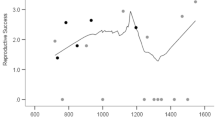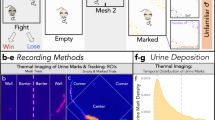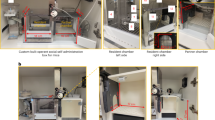Abstract
SOCIAL identification in mice appears to be based largely on the odour complex presented by an animal. The exact nature, as well as the relative importance and signal function of its components—metabolic, glandular and environmental—are still being investigated1, but their efficacy as olfactory cues is reduced by applying scent to an animal2 or by dabbing a mouse with the urine of another, which tends to elicit from conspecifics social responses in accordance with the “urine label”3–5, at least as far as fighting or exemption from it is concerned. This suggests that the odour of urine present in some quantity overrides other olfactory cues, and that there may be a relationship between social behaviour and the extent of concurrent elimination. Although the active use of urination in territorial marking has long been known6 and its occurrence in “open field” tests, where it is generally regarded as a fear response or an index of “emotionality”, has received much experimental study, less is known about its incidence and import in social contexts, and the experiments reported here—carried out as part of a study of social sniffing—are an attempt to examine this point.
This is a preview of subscription content, access via your institution
Access options
Subscribe to this journal
Receive 51 print issues and online access
$199.00 per year
only $3.90 per issue
Buy this article
- Purchase on Springer Link
- Instant access to full article PDF
Prices may be subject to local taxes which are calculated during checkout
Similar content being viewed by others
References
Bronson, F. H., Biol., Reprod., Suppl. 2 (in the press).
Ropartz, P., Anim. Behav., 16, 97 (1968).
Ropartz, P., Coll. Intern. Cent. Nat. Res. Scient., No. 173, 1 (1967).
MacKintosh, J. H., and Grant, E. C., Zeitschr. Tierpsychol., 23, 584 (1966).
Mugford, R. A., and Nowell, N. W., Nature, 226, 967 (1970).
Eibl-Eibesfeldt, I., Zeitschr. Tierpsychol., 7, 558 (1951).
Barnett, S. A., in Aggressive Behaviour (edit. by Garattini, S., and Sigg, E. B.) (Excerpta Medica Foundation, Amsterdam, 1969).
Michael, R. P., and Keverne, E. B., Nature, 218, 746 (1968).
Michael, R. P., and Keverne, E. B., Nature, 225, 84 (1970).
Schultze-Westrum, T., Zeitschr. Vergl. Physiol., 50, 151 (1965).
Whitten, W. K., J. Endocrinol., 17, 307 (1958).
Bruce, H. M., Nature, 184, 105 (1959).
Dominic, C. J., J. Reprod. Fertil., 10, 469 (1965).
Beniest-Noirot, E., Monogr. Fr. Psychol., No. 1 (1958).
Comfort, A., New Scientist and Science J., 49, 720, 412 (1971).
Author information
Authors and Affiliations
Rights and permissions
About this article
Cite this article
REYNOLDS, E. Urination as a Social Response in Mice. Nature 234, 481–483 (1971). https://doi.org/10.1038/234481a0
Received:
Revised:
Issue Date:
DOI: https://doi.org/10.1038/234481a0
This article is cited by
-
Flexible scaling and persistence of social vocal communication
Nature (2021)
-
Voluntary urination control by brainstem neurons that relax the urethral sphincter
Nature Neuroscience (2018)
-
Patterns of deposition of urine containing chemosignals that affect puberty and reproduction by wild stock male and female house mice (Mus domesticus)
Journal of Chemical Ecology (1989)
-
Odor-guided behavior in mammals
Experientia (1986)
Comments
By submitting a comment you agree to abide by our Terms and Community Guidelines. If you find something abusive or that does not comply with our terms or guidelines please flag it as inappropriate.



